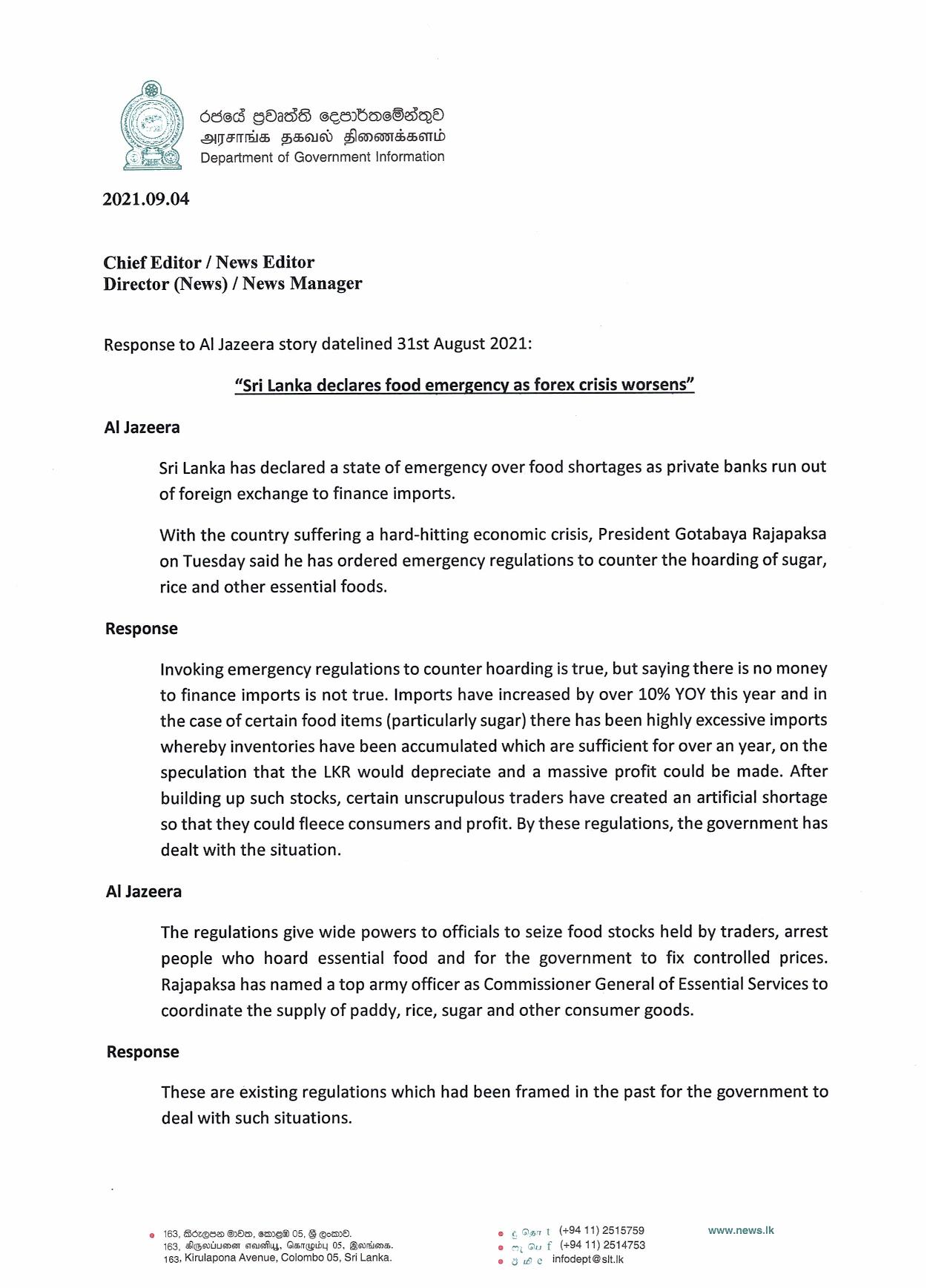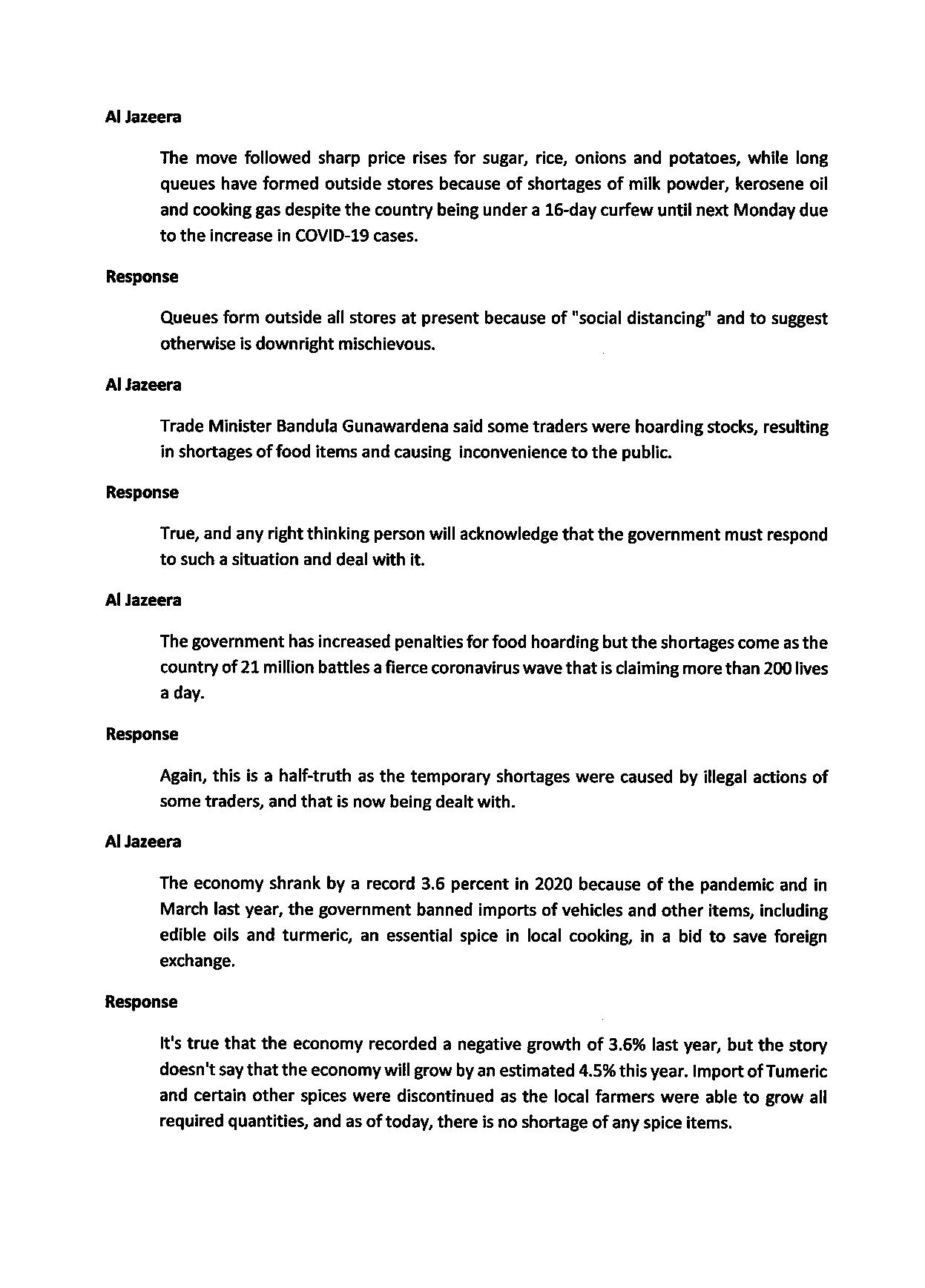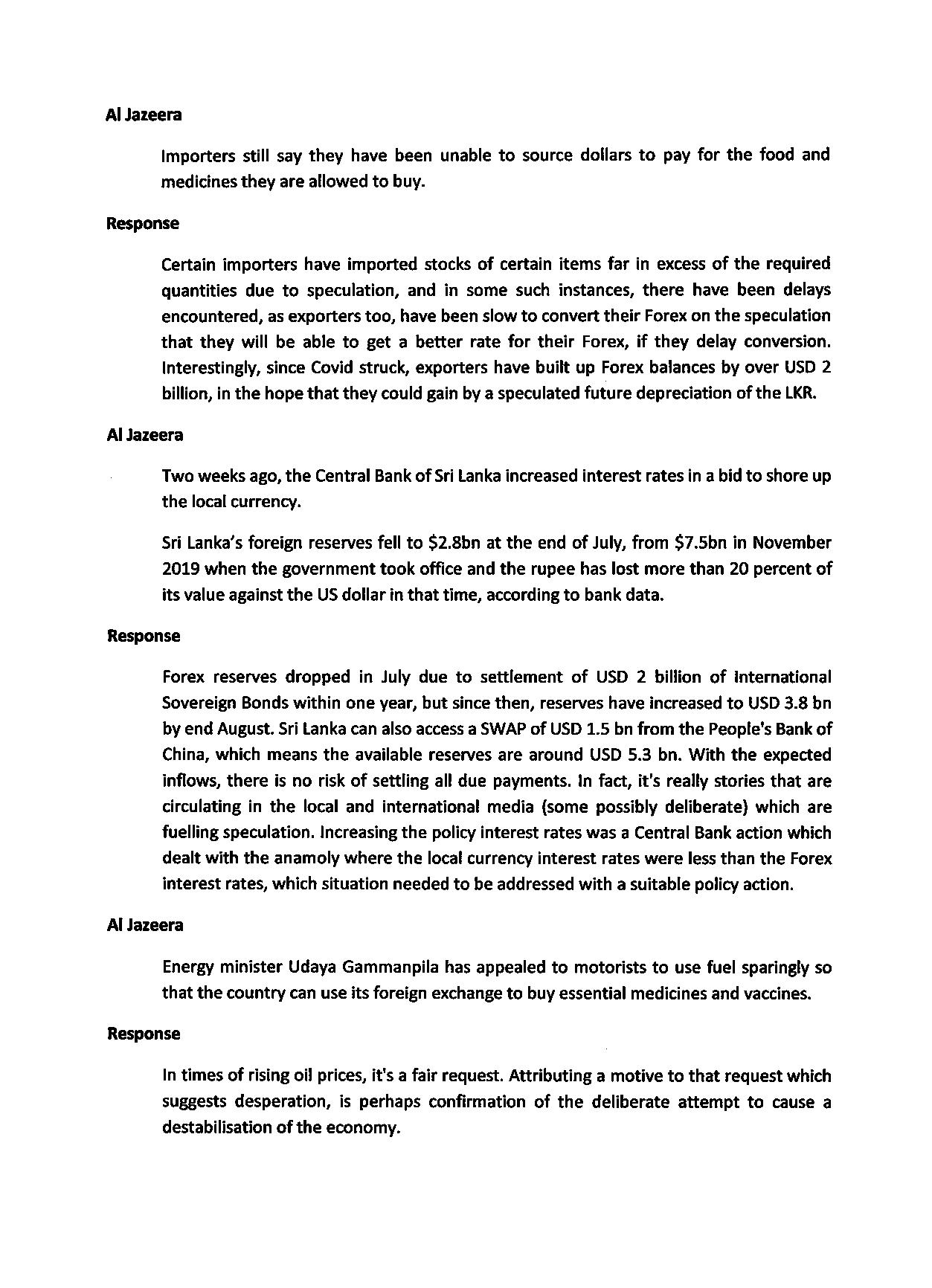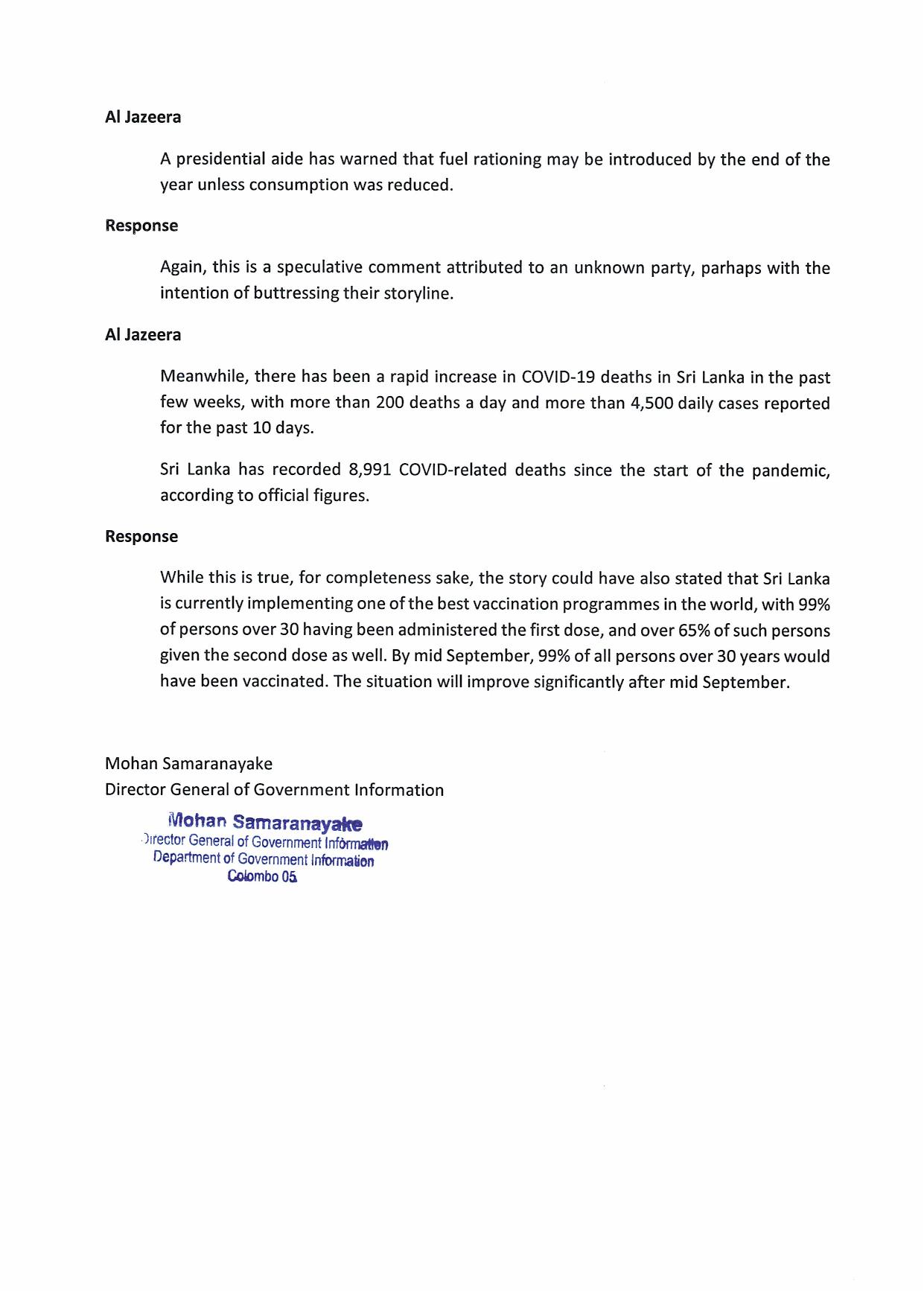Response to Al Jazeera story datelined 31st August 2021:
“Sri Lanka declares food emergency as forex crisis worsens”
--------------------------------------------------------------------------------
Al Jazeera
Sri Lanka has declared a state of emergency over food shortages as private banks run
out of foreign exchange to finance imports.
With the country suffering a hard-hitting economic crisis, President Gotabaya Rajapaksa
on Tuesday said he has ordered emergency regulations to counter the hoarding of
sugar, rice and other essential foods.
Response
Invoking emergency regulations to counter hoarding is true, but saying there is no
money to finance imports is not true. Imports have increased by over 10% YOY this year
and in the case of certain food items (particularly sugar) there has been highly excessive
imports whereby inventories have been accumulated which are sufficient for over an
year, on the speculation that the LKR would depreciate and a massive profit could be
made. After building up such stocks, certain unscrupulous traders have created an
artificial shortage so that they could fleece consumers and profit. By these regulations,
the government has dealt with the situation.
Al Jazeera
The regulations give wide powers to officials to seize food stocks held by traders, arrest
people who hoard essential food and for the government to fix controlled prices.
Rajapaksa has named a top army officer as Commissioner General of Essential Services
to coordinate the supply of paddy, rice, sugar and other consumer goods.
Response
These are existing regulations which had been framed in the past for the government to
deal with such situations.
Al Jazeera
The move followed sharp price rises for sugar, rice, onions and potatoes, while long
queues have formed outside stores because of shortages of milk powder, kerosene oil
and cooking gas despite the country being under a 16-day curfew until next Monday due
to the increase in COVID-19 cases.
Response
Queues form outside all stores at present because of "social distancing" and to suggest
otherwise is downright mischievous.
Al Jazeera
Trade Minister Bandula Gunawardena said some traders were hoarding stocks, resulting
in shortages of food items and causing inconvenience to the public.
Response
True, and any right thinking person will acknowledge that the government must respond
to such a situation and deal with it.
Al Jazeera
The government has increased penalties for food hoarding but the shortages come as
the country of 21 million battles a fierce coronavirus wave that is claiming more than
200 lives a day.
Response
Again, this is a half-truth as the temporary shortages were caused by illegal actions of
some traders, and that is now being dealt with.
Al Jazeera
The economy shrank by a record 3.6 percent in 2020 because of the pandemic and in
March last year, the government banned imports of vehicles and other items, including
edible oils and turmeric, an essential spice in local cooking, in a bid to save foreign
exchange.
Response
It's true that the economy recorded a negative growth of 3.6% last year, but the story
doesn't say that the economy will grow by an estimated 4.5% this year. Import of
Tumeric and certain other spices were discontinued as the local farmers were able to
grow all required quantities, and as of today, there is no shortage of any spice items.
Al Jazeera
Importers still say they have been unable to source dollars to pay for the food and
medicines they are allowed to buy.
Response
Certain importers have imported stocks of certain items far in excess of the required
quantities due to speculation, and in some such instances, there have been delays
encountered, as exporters too, have been slow to convert their Forex on the speculation
that they will be able to get a better rate for their Forex, if they delay conversion.
Interestingly, since Covid struck, exporters have built up Forex balances by over USD 2
billion, in the hope that they could gain by a speculated future depreciation of the LKR.
Al Jazeera
Two weeks ago, the Central Bank of Sri Lanka increased interest rates in a bid to shore
up the local currency.
Sri Lanka’s foreign reserves fell to $2.8bn at the end of July, from $7.5bn in November
2019 when the government took office and the rupee has lost more than 20 percent of
its value against the US dollar in that time, according to bank data.
Response
Forex reserves dropped in July due to settlement of USD 2 billion of International
Sovereign Bonds within one year, but since then, reserves have increased to USD 3.8 bn
by end August. Sri Lanka can also access a SWAP of USD 1.5 bn from the People's Bank
of China, which means the available reserves are around USD 5.3 bn. With the expected
inflows, there is no risk of settling all due payments. In fact, it's really stories that are
circulating in the local and international media (some possibly deliberate) which are
fuelling speculation. Increasing the policy interest rates was a Central Bank action which
dealt with the anamoly where the local currency interest rates were less than the Forex
interest rates, which situation needed to be addressed with a suitable policy action.
Al Jazeera
Energy minister Udaya Gammanpila has appealed to motorists to use fuel sparingly so
that the country can use its foreign exchange to buy essential medicines and vaccines.
Response
In times of rising oil prices, it's a fair request. Attributing a motive to that request which
suggests desperation, is perhaps confirmation of the deliberate attempt to cause a
destabilisation of the economy.
Al Jazeera
A presidential aide has warned that fuel rationing may be introduced by the end of the
year unless consumption was reduced.
Response
Again, this is a speculative comment attributed to an unknown party, parhaps with the
intention of buttressing their storyline.
Al Jazeera
Meanwhile, there has been a rapid increase in COVID-19 deaths in Sri Lanka in the past
few weeks, with more than 200 deaths a day and more than 4,500 daily cases reported
for the past 10 days.
Sri Lanka has recorded 8,991 COVID-related deaths since the start of the pandemic,
according to official figures.
Response
While this is true, for completeness sake, the story could have also stated that Sri Lanka
is currently implementing one of the best vaccination programmes in the world, with
99% of persons over 30 having been administered the first dose, and over 65% of such
persons given the second dose as well. By mid September, 99% of all persons over 30
years would have been vaccinated. The situation will improve significantly after mid
September.
















